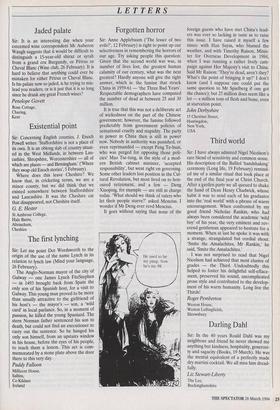Forgotten horror
Sir: Anne Applebaum (`The lesser of two evils?', 12 February) is right to point up our selectiveness in remembering the horrors of our age. Try asking people this question: Given that the second world war was, in number of lives lost, the greatest human calamity of our century, what was the next greatest? Hardly anyone will give the right answer, which is: the famine that struck China in 1959-61 ŌĆö 'the Three Bad Years'. Respectable demographers have computed the number of dead at between 25 and 30 million.
It is true that this was not a deliberate act of wickedness on the part of the Chinese government; however, the famine followed predictably from government policies of sensational cruelty and stupidity. The party in power in China then is still in power now. Nobody in authority was punished, or even reprimanded ŌĆö except Peng Te-huai, who was purged for opposing those poli- cies! Mao Tse-tung, in the style of a mod- ern British cabinet minister, 'accepted responsibility', but went right on governing. Some other leaders lost position in the Cul- tural Revolution, but most lived on to hon- oured retirement, and a few ŌĆö Deng Xiaoping, for example ŌĆö are still in charge today. 'What should we think of rulers who let their people starve?' asked Mencius. I wonder if Mr Deng ever read Mencius.
It goes without saying that none of the foreign guests who have met China's lead- ers was ever so lacking in taste as to raise this issue. I have raised it myself a few times: with Han Suyin, who blamed the weather, and with Timothy Raison, Minis- ter for Overseas Development in 1984, when I was running a rather lively cam- paign against Her Majesty's visit to China. Said Mr Raison: 'They're dead, aren't they? What's the point of bringing it up?' I don't know (and I suppose one could put the same question to Mr Spielberg if one got the chance); but 25 million does seem like a lot ŌĆö a million tons of flesh and bone, even at starvation point.
John Derbyshire
15 Chestnut Street, Huntingdon, New York, USA


























































 Previous page
Previous page